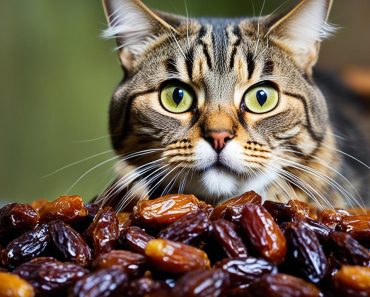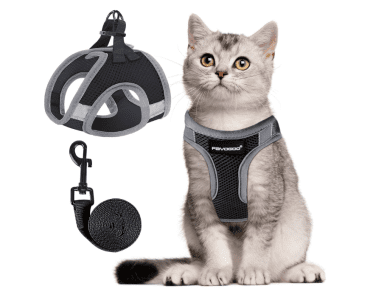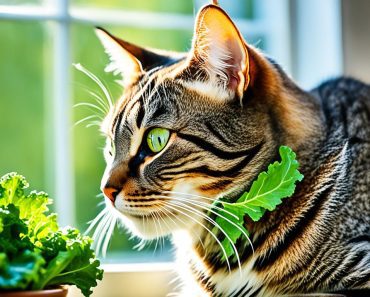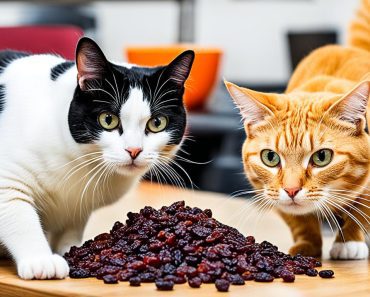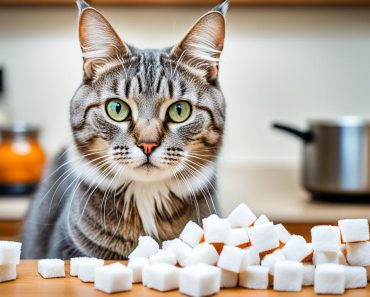Giving our furry friends the right food is essential for their health and happiness. As a cat lover, you may wonder if your feline companion can enjoy a tasty treat like yogurt. Well, the answer is yes, but with some important considerations.
Plain and unsweetened yogurt can be safe for cats to consume. The live bacteria in yogurt makes it easier for cats to break down lactose compared to other dairy products. However, before you start sharing your yogurt, it’s crucial to consult with your veterinarian to ensure it’s suitable for your cat’s specific dietary needs.
Can Cats Eat Yogurt? Yes, they can, with caution.
- While cats can eat plain and unsweetened yogurt, it’s important to consult with your vet first.
- Kittens should avoid yogurt due to their sensitive stomachs.
- Yogurt contains protein, calcium, vitamins, and minerals, but these can be obtained from their regular diet.
- If you want to add probiotics to your cat’s diet, consult your vet for cat-specific supplements.
- Yogurt can be given as an occasional treat, but it is not essential for their overall health.
Is Yogurt Safe for Cats?
Many cat owners wonder, “Is yogurt safe for cats?” While cats can eat yogurt, it’s important to keep in mind that dairy products can cause gastrointestinal upset in many felines due to lactose intolerance. If your cat experiences symptoms like diarrhea or vomiting after consuming dairy, they may be lactose intolerant.
However, if your cat can tolerate dairy, small amounts of plain and unsweetened yogurt can be given as an occasional treat. The live bacteria in yogurt can help with digestion, but it is not necessary for their overall health.
While yogurt can offer certain benefits, such as protein and calcium, these nutrients can be obtained from your cat’s regular diet. Therefore, yogurt is not essential for their nutritional needs. If you’re looking to add probiotics to your cat’s diet, it’s best to consult with your veterinarian for cat-specific supplements designed to promote feline health.
Nutritional Benefits of Yogurt for Cats
Yogurt can offer some nutritional benefits for cats, including protein, calcium, vitamins B2 and B12, potassium, and magnesium. These nutrients are important for maintaining overall feline health. However, it’s essential to note that cats already receive these nutrients from their complete and balanced diet, so yogurt is not a necessary addition.
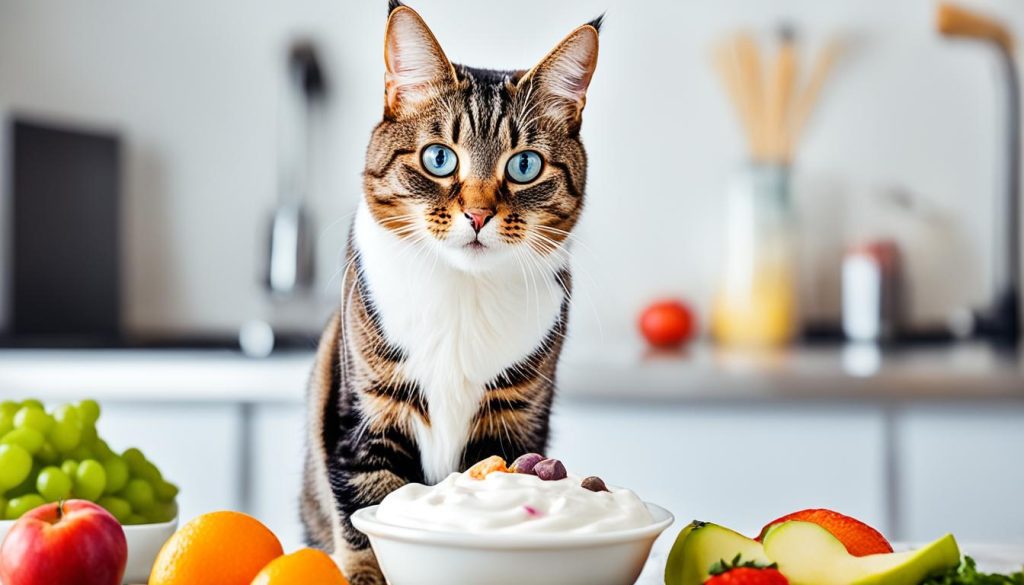
One of the key components of yogurt that may be beneficial for cats is the presence of probiotics. Probiotics are live bacteria that can aid in digestion and promote a healthy gut. They can help regulate the digestive system and improve nutrient absorption. However, it’s important to consult with your vet before incorporating yogurt or any other probiotic-containing foods into your cat’s diet.
While yogurt does contain probiotics, it’s worth considering cat-specific probiotic supplements. These supplements are formulated specifically for feline health and often have fewer calories and harmful additives compared to yogurt. Your veterinarian can guide you in choosing the right probiotic supplement for your cat, taking into account their specific needs and dietary requirements.
It’s important to remember that as with any dietary changes, moderation is key. Yogurt should only be given to cats in small amounts and as an occasional treat. The primary source of nutrition for cats should come from a well-balanced and veterinarian-recommended cat food. This ensures that your cat receives all the necessary nutrients without the risk of overfeeding or potential digestive issues.
Overall, while yogurt can provide some nutritional benefits and probiotics for cats, it’s not an essential component of their diet. Consultation with your veterinarian is crucial to determine the best approach to address your cat’s specific dietary needs and to explore suitable alternatives.
How to Safely Feed Yogurt to Your Cat
If your cat can tolerate dairy, you can give them small amounts of plain, unsweetened yogurt. The live bacteria in yogurt makes it easier for cats to digest lactose compared to other dairy products. However, it’s important to remember a few guidelines when feeding yogurt to your cat.
- Firstly, opt for plain and unsweetened yogurt. Flavored yogurts or those with added sweeteners can contain toxic ingredients that are harmful to cats.
- Stick to simple, plain yogurt to ensure their safety and health.
- Moderation is key. Treats like yogurt should not make up more than 10 percent of your cat’s daily caloric intake.
- While yogurt can provide some nutritional benefits, it’s important to maintain a balanced and complete diet.
- Consider yogurt as an occasional treat rather than a regular part of their feeding routine.
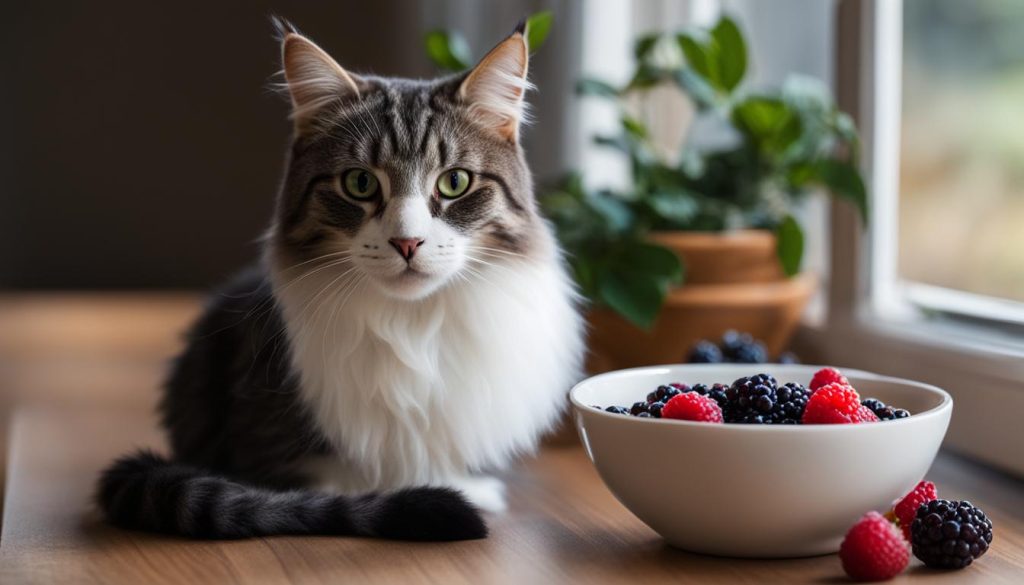
If you’re unsure about feeding yogurt to your cat or if they have any dietary sensitivities, consult with your veterinarian. They can provide personalized advice based on your cat’s specific needs and health condition.
Lastly, consider exploring alternative options for cat treats. There are many cat-specific treats available in the market that are formulated to meet their nutritional requirements. These treats often contain ingredients that are beneficial for cats, such as high-quality proteins and essential vitamins and minerals.
While yogurt can be safely fed to cats in small amounts, it’s important to exercise caution and moderation. Plain, unsweetened yogurt is the best option if your cat can tolerate dairy. Remember to consult with your vet and consider cat-specific treats as alternatives to yogurt for their overall health and well-being.
Conclusion
While cats can eat yogurt, it is not essential for their diet. Before introducing yogurt to your cat’s diet, it is important to consult with your vet. They can provide feline-specific diet tips and recommend cat-specific supplements or treats that cater to your cat’s nutritional needs.
If you do choose to offer yogurt to your cat, it should be plain and unsweetened. Avoid flavored yogurts or those with added sweeteners, as these can contain toxic ingredients that are harmful to cats. Remember, treats should only make up a small percentage of your cat’s daily caloric intake, so moderation is key.
While yogurt does contain some beneficial nutrients, such as protein, calcium, and vitamins, these can be obtained from your cat’s regular diet. Providing a balanced and nutritious feline diet through veterinarian-recommended cat food is the best way to ensure your cat gets the necessary nutrients for optimal feline health.
When it comes to yogurt and the feline diet, it’s always best to prioritize your cat’s health and consult with a vet. They can provide personalized recommendations based on your cat’s specific needs and help you make informed decisions about their dietary choices.

